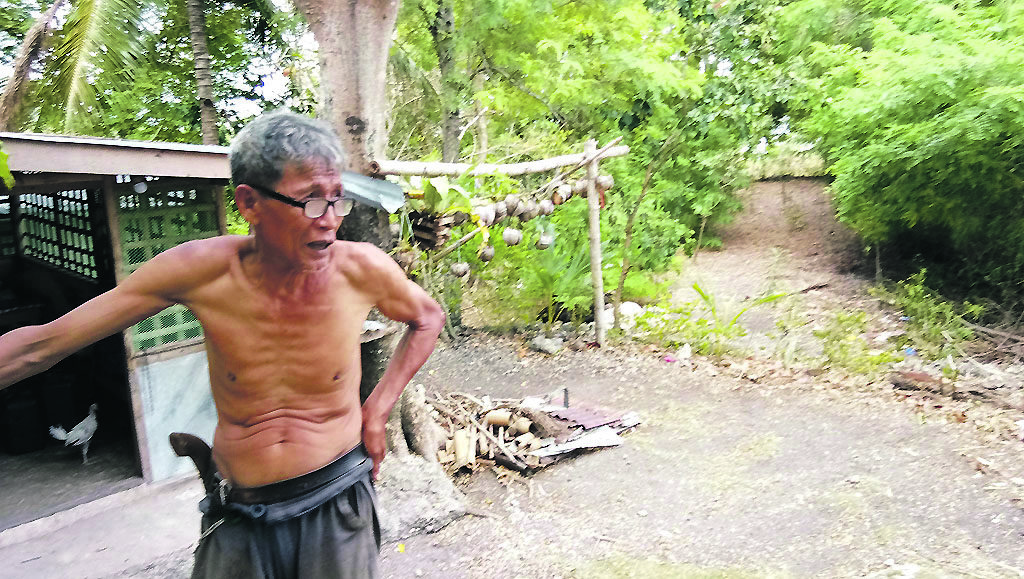
AGRICULTURE CHALLENGE
Based on a 2017 survey of the Department of Agriculture (DA), the average age of farmers in the Philippines today is 60 years old.
For DA, the trend was worrisome as young generation of Filipinos no longer seem to want to take on farming as an industry.
“We are really worried about this situation. Our young generation now a days really lack interest in farming. They would rather choose to enroll in computer and medical related courses,” said Melquiades Ibarra, information officer of DA-7 on the country’s declining farmer population.
To help draw interest, the DA is offering scholarships to students who are interested to enroll in agriculture-related courses such as Animal Science, Horticulture, and Agribusiness among others.
DA hoped that through the scholarship program, the children of marginal farmers would take interest in tending their parents’ farms.
A farmer’s story
Tatay Vicente Isles is a 67-year-old farmer in search of a successor.
As a young boy in the 50’s, Isles would go to his family’s farm in Barangay Bagatayam, Sogod town, after school to help his parents who were both farmers.
“From elementary to high school, after my class, I would visit our farm. My parents used to plant tobacco. During harvest season, they would earn at around P500.” Isles said in Cebuano.
Although he graduated from a two-year course, Isles opted to continue his parents’ legacy by becoming a farmer himself.
Isles said that his life as a farmer was not easy.
“Most of the time, we only harvested enough for our consumption. Sometimes, we even needed to buy food because our harvest was not enough,” he told Cebu Daily News.
To augment their family income, Isles said the family also raised farm animals like pigs, goats and cows aside from planting corn.
Isles is married to a public school teacher, Teresita, 70. They have five children: Gracesila, Gracelyn, Vincent, Vicente Jr., and Ethyl Grace.
Because his wife’s teaching assignment was in Daanbantayan, Isles’ children had to move to the northern town to study while he was left alone tending their farm in Sogod.
“During harvest season, I would just send them milled corn or sometimes, raw corn and they will just go to a store that grinds corn so that they can cook and eat it,” Isles said.
With the help of his wife, all their children graduated from college.
“Now that all my children are professionals, I don’t know who would succeed me as a farmer. I cannot force them to like farming,” said Isles.
Gracesila and Gracelyn are both public school teachers like their mother; while Vincent is now a lawyer; Vicente Jr., a computer engineer; and Ethyl Grace, a nurse working in Germany.
His son, Vincent, said that he had no interest in farming; especially that he witnessed first hand the difficult life of his father.
“While we were growing up, our parents have also instilled in our minds that we have to finish our studies so that we will have a better life because the life of a farmer is really hard, especially that my father is only a marginal farmer,”Vincent said.
“ Time will come, when my body could no longer work, then I will just leave my farm,” said the older Isles of his one-hectare farmland.
His children have asked him to come live with them but it is an offer that he has refused for now.
Problems
While Isles continues to till his farm, it has not been easy, he said, especially with the quality of the soil and the country’s unpredictable weather.
“Before, we used to grow our crops even without using fertilizers, but now, if you don’t add fertilizers to your farm, your crops would no longer grow,” Isles said.
He was unable to harvest enough corn this year after his farm experienced drought.
For his part, Vincent urged the government to implement programs to support farmers like his father.
Monocropping
Across the region, many farms deteriorate due to monocropping practices.
Monocropping is the agricultural practice of growing a single crop year after year on the same land, in the absence of rotation through other crops or growing multiple crops on the same land.
DA’s Ibarra said that planting the same crop in the same place each year zaps the nutrients from the earth and leaves the soil weak and unable to support healthy plant growth.
He advised Isles to let his farm rest for a year, by not planting any crop.
Farmers like Isles, he said, may also visit their town’s agriculture office or the DA regional office to inquire about new technologies.
Based on a 2012 agriculture census conducted by the Philippine Statistics Authority (PSA), the country has a total of 5.56 million farms covering 7.19 million hectares.
This translates to an average area of 1.29 hectares per farm.
The report added that 99 percent or 5.51 million of the farms in the country were operated by households or individual persons.
Farms operated by partnerships accounted for only 1.
Disclaimer: The comments uploaded on this site do not necessarily represent or reflect the views of management and owner of Cebudailynews. We reserve the right to exclude comments that we deem to be inconsistent with our editorial standards.
